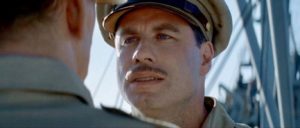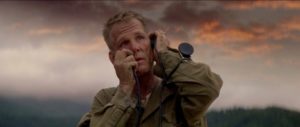The Thin Red Line (1998). Written and directed Terrence Malick. Starring James Caviezel, Sean Penn, Nick Nolte, and Elias Koteas. 170 mins; rated R. Metacritic: 78%; Rotten Tomatoes: 79%.
Despite the plethora of smarmy villains and gnarly monsters, American films of any sort rarely take on a dead-serious probing exploration of evil, human and otherwise. There are exceptions, of course, some glorious ones, to be sure: classics like the Godfather series, Chinatown, The Deer Hunter, the original Star Wars saga as well as the recent reboot. What distinguishes these films is their surprises about the nature of evil and where evil shows up, especially with regard to its presence with the seemingly heroic central characters. Usually in these films, it not only takes a while not only for the audience to recognize evils afoot but so also especially for the protagonist, especially when it comes to its presence with himself (all these characters are men).
We run into a raft of such folk, misbegotten and otherwise, in Terrence Malick’s singular war film, The Thin Red Line (1998). There are obvious bad guys, for sure, like those few foot soldiers who, for who knows what reasons, torment and pillage captured and dead Japanese troops, just as they do wildlife. Combat can do strange things to otherwise decent people. It is a high price for walking through the gates of hell at the behest of others warm and secure on the “home front.” Soldiers usually do their best, till stress and terror get the best of them. It is a wonder they do as well as they do in uniform and after.
There are others, though, who should know better, and do, but simply don’t care, so enamored are they of their own power and thirsts for whatever. And, worse still, they ensnare others in their guile and lust for power and/or glory. The first we run into is the most powerful man in the film, General Quintard, played by John Travolta in a memorable cameo.

Three scenes into the film we find the general in a mix of compliment, condescension, and threat, cajoling and coercing Major Tall, an under-promoted career soldier, to win, no matter the cost in soldiers’ lives. If he wants overdue promotions, well, that’s the price, and Quintard goads with thinly veiled insult. Without ever naming it, both know the game their playing and the dance goes on and on.
As for Tall (Nick Nolte, in one of his best performances), he’s willing to put aside all he once was as a human being. In the interior voiceover commentary that reacts to Quintard’s monologue, Tall reckons with his predicament, knowing “what he would have given for love’s sake.” Now, though, he thrusts aside his once honorable career for battlefield success, no matter the cost. He bullies and then fires and ships stateside his able underling, Staros (Elias Koteas), simply because he mildly questions Tall’s goals and strategy. Suddenly war is not about territory and control, though both measure success, but success itself, no matter the cost. His pursuit is essentially mad, modelled as he is after mad Ahab in Herman Melville’s magnificent Moby Dick, though old Ahab has a nobler goal, that of facing down God’s apparent affronts to humankind (another character gets his name from the novel as well, Staros echoing Starbuck, the First Mate who challenges Ahab’s quest to kill the white whale because it will cost the lives of his crew). Still, again like Ahab, Tall cannot purge his soul of the goodness of life. One dawn Tall recalls Homer’s adoration of light, a passage he recites aloud in the Greek he learned at West Point.

In both instances, the leaders mask real motives in patriotic tripe, as does Staros’ successor, Captain Charles Bosche (George Clooney doing cameo work), whose name reveals all we need to know of his supposed leadership. An antidote of sorts, and perhaps Malick’s mouthpiece, is the nihilist 1st Sergeant Welsh (Sean Penn) who sees only deceit and self-pursuit from top to bottom. All the talk of noble patriotism is simply a means to induct unwitting souls into the war’s big lie. Still, despite all this scorn, it is Welsh who seems the model leader, doing what he must wisely as a gesture of care about his men, though he asserts that he would rather be “numb” than care, as he amply does about the war’s constant horrors and suffering.
Power corrupts and damns, almost inevitably, inside the church and out, liberal or conservative, and rare is the leader who can detect its infection, and wise would we be if we bore that in mind, as Yoda would say. Then again, full of disdain and ego, others don’t bother to hide much at all, happily flaunting their disdain for all unlike and below themselves in kind and power. Be wary, and God help us, oh please.
Sign Up for Our Newsletter!
Insights on preaching and sermon ideas, straight to your inbox. Delivered Weekly!
Categorized into Evil
The Thin Red Line (1998) – 3